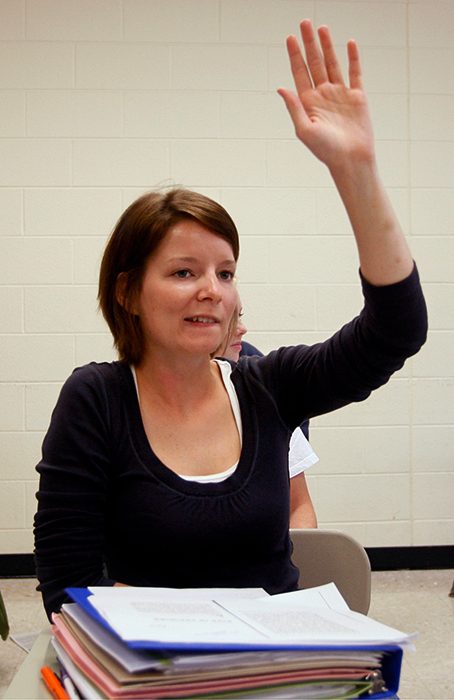Women’s Studies 101 should be required
ALLISON LONG | Tribune News Service
Christie Jones, who used a scholarship designed for former foster children, participates in a Women Studies class at the University of Kansas in Lawrence, Kansas, September 26, 2007.
March 2, 2017
Identifying as a feminist often yields disrespectful and confused reactions. People ask “why do you hate men?” or make remarks that sexism ended a long time ago, and that feminism is no longer necessary.
It is as if being a feminist is taboo.
To combat some of the misconceptions about feminism and women, introductory women’s studies should be a required class for all undergraduate students.
Feminism is for everybody. Today, numerous misrepresentations of what feminist beliefs look like run rampant. Thus, many media outlets portray toxic stereotypes of feminism.
If you believe in ending the “discrimination, exploitation and oppression” of anyone regardless of “gender, sexual orientation, race, class and other differences,” then you are a feminist, according to the online magazine Everyday Feminism.
Feminist movements have been an integral part of American history. As documented by the archives of the U.S. House of Representatives, the earliest women’s rights movements started in 1848. However, a woman’s right to vote began in 1920 with the creation of the 19th amendment.
Historically, women have been treated unequally. It is important for all citizens to be aware of equality issues so that, as Americans, we can foster a just society.
Women’s studies is not just for women. Basic knowledge of the topic extends to countless disciplines and facets of society.
At WSU, women’s studies 101 is an introductory women’s studies course taught by Leigh Gaskin. She is an instructor within the department of critical culture, gender and race studies. In the course, students learn about non-binary gender, sex, body image, reproductive justice issues, the environment and social justice.
The course gives students an understanding of the world in the context of gender. Gaskin explained that college is about finding out who you are, and women’s studies classes can really help.
“It’s a great way for you to understand current social and political things,” she said, “in addition to combining it with popular culture and personal perspective.”
The course helps students engage with topics that are critical to the political climate right now.
It is important to understand why people fight for women’s rights, so that students can make informed political decisions.
Gaskin explained that, as a country, we are at a noteworthy moment in history. Women’s studies 101 helps students to comprehend other people’s views.
“Whenever you take a women’s studies class, it’s not us telling you what to think,” she said. “It’s teaching you different skills in order to interpret the world that you live in.”
College is a place to cultivate the skills and relationships that will be beneficial to students after graduation.
WSU seeks to “extend knowledge” that helps “emerging scholars [to] realize their highest potential,” according to the university’s official mission statement.
“Quite often, I find that my students leave at the end of the semester feeling like they’re more empowered, that they’re better able to make decisions that concern themselves,” Gaskin said.
Above all, Gaskin explained students leave with a heightened sense of empathy. Women’s studies 101 can give students a skill set they perhaps did not have previously.
Developing empathy can help students relate to one another, and engage in deeper, more meaningful relationships.
A mandatory introduction to women’s studies class would provide undergraduates with better comprehension of feminism and gender that would enrich their everyday lives.
Geana Javier is a sophomore economics major from Seattle. She can be contacted at 335-2290 or by [email protected]. The opinions expressed in this column are not necessarily those of the staff of The Daily Evergreen or those of The Office of Student Media.








